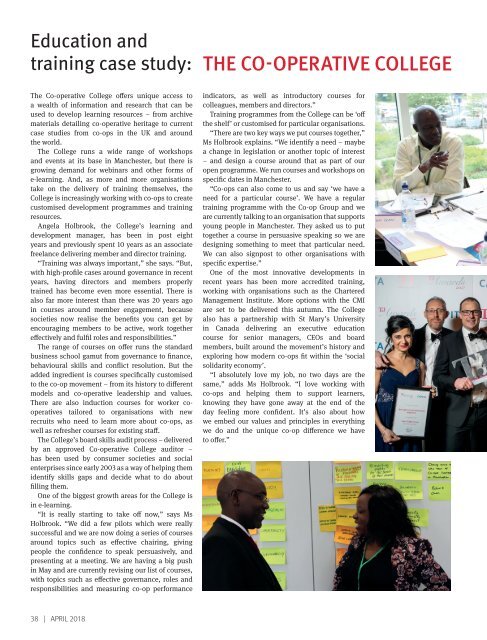APRIL 2018
The April 2018 edition of Co-op News: connecting, challenging and championing the global co-operative movement. This issue, in the lead up to Co-operative Education Conference, we look at how co-ops are putting principle 5 into action in the 21st century. We also celebrate 150 years of the East of England Co-op and present updates from the Co-op Retail and Abcul conferences.
The April 2018 edition of Co-op News: connecting, challenging and championing the global co-operative movement. This issue, in the lead up to Co-operative Education Conference, we look at how co-ops are putting principle 5 into action in the 21st century. We also celebrate 150 years of the East of England Co-op and present updates from the Co-op Retail and Abcul conferences.
Create successful ePaper yourself
Turn your PDF publications into a flip-book with our unique Google optimized e-Paper software.
Education and<br />
training case study: THE CO-OPERATIVE COLLEGE<br />
The Co-operative College offers unique access to<br />
a wealth of information and research that can be<br />
used to develop learning resources – from archive<br />
materials detailing co-operative heritage to current<br />
case studies from co-ops in the UK and around<br />
the world.<br />
The College runs a wide range of workshops<br />
and events at its base in Manchester, but there is<br />
growing demand for webinars and other forms of<br />
e-learning. And, as more and more organisations<br />
take on the delivery of training themselves, the<br />
College is increasingly working with co-ops to create<br />
customised development programmes and training<br />
resources.<br />
Angela Holbrook, the College’s learning and<br />
development manager, has been in post eight<br />
years and previously spent 10 years as an associate<br />
freelance delivering member and director training.<br />
“Training was always important,” she says. “But,<br />
with high-profile cases around governance in recent<br />
years, having directors and members properly<br />
trained has become even more essential. There is<br />
also far more interest than there was 20 years ago<br />
in courses around member engagement, because<br />
societies now realise the benefits you can get by<br />
encouraging members to be active, work together<br />
effectively and fulfil roles and responsibilities.”<br />
The range of courses on offer runs the standard<br />
business school gamut from governance to finance,<br />
behavioural skills and conflict resolution. But the<br />
added ingredient is courses specifically customised<br />
to the co-op movement – from its history to different<br />
models and co-operative leadership and values.<br />
There are also induction courses for worker cooperatives<br />
tailored to organisations with new<br />
recruits who need to learn more about co-ops, as<br />
well as refresher courses for existing staff.<br />
The College’s board skills audit process – delivered<br />
by an approved Co-operative College auditor –<br />
has been used by consumer societies and social<br />
enterprises since early 2003 as a way of helping them<br />
identify skills gaps and decide what to do about<br />
filling them.<br />
One of the biggest growth areas for the College is<br />
in e-learning.<br />
“It is really starting to take off now,” says Ms<br />
Holbrook. “We did a few pilots which were really<br />
successful and we are now doing a series of courses<br />
around topics such as effective chairing, giving<br />
people the confidence to speak persuasively, and<br />
presenting at a meeting. We are having a big push<br />
in May and are currently revising our list of courses,<br />
with topics such as effective governance, roles and<br />
responsibilities and measuring co-op performance<br />
indicators, as well as introductory courses for<br />
colleagues, members and directors.”<br />
Training programmes from the College can be ‘off<br />
the shelf’ or customised for particular organisations.<br />
“There are two key ways we put courses together,”<br />
Ms Holbrook explains. “We identify a need – maybe<br />
a change in legislation or another topic of interest<br />
– and design a course around that as part of our<br />
open programme. We run courses and workshops on<br />
specific dates in Manchester.<br />
“Co-ops can also come to us and say ‘we have a<br />
need for a particular course’. We have a regular<br />
training programme with the Co-op Group and we<br />
are currently talking to an organisation that supports<br />
young people in Manchester. They asked us to put<br />
together a course in persuasive speaking so we are<br />
designing something to meet that particular need.<br />
We can also signpost to other organisations with<br />
specific expertise.”<br />
One of the most innovative developments in<br />
recent years has been more accredited training,<br />
working with organisations such as the Chartered<br />
Management Institute. More options with the CMI<br />
are set to be delivered this autumn. The College<br />
also has a partnership with St Mary’s University<br />
in Canada delivering an executive education<br />
course for senior managers, CEOs and board<br />
members, built around the movement’s history and<br />
exploring how modern co-ops fit within the ‘social<br />
solidarity economy’.<br />
“I absolutely love my job, no two days are the<br />
same,” adds Ms Holbrook. “I love working with<br />
co-ops and helping them to support learners,<br />
knowing they have gone away at the end of the<br />
day feeling more confident. It’s also about how<br />
we embed our values and principles in everything<br />
we do and the unique co-op difference we have<br />
to offer.”<br />
38 | <strong>APRIL</strong> <strong>2018</strong>


















